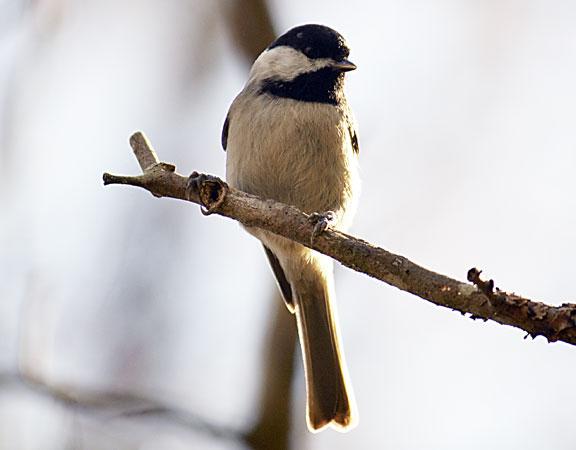
As the weather here in Northfield starts to take a more amicable turn, hopefully you all get a chance to spend some time outdoors and outside the hustle and bustle of Week 8. All around campus, colorful chirps are enriching our auditory landscape and giving us a break from the harsh caws of crows as our smaller avian neighbors prepare for the upcoming breeding season.
The Black-capped Chickadee (Poecile atricapillus) does not nest until late April to June, but defense for nesting territory already begins in early spring. In addition to the frequently heard foraging and alerting call “chickadee-dee-dee” (the more “dee”s, the more urgent the message), you can also hear the whistled song “fee-bee-ee” that is typical in pre-breeding and breeding seasons. Males perform two types of songs during mating season: the aggressive songs that imitate another male’s pitch, and the submissive songs that use a different pitch to evade the voice of more powerful competitors. Though chickadees are usually considered monogamous (the nestlings in a male’s nest are his own offspring), females would alter their reproductive strategy if they overhear their partner (especially if the male happens to be higher up on the dominance hierarchy of the flock) losing such a song competition. Mennill, the researcher who discovered this in 2002, replicated an aggressive song by playing back the frequencies of high-ranking males for the females to hear; later, when he tested for the biological father of their young, half of the nestlings weren’t theirs. Not your usual karaoke night.
The Northern Cardinal (Cardinalis cardinalis) starts nest-building in late February, while courtship display begins from January to February. Cardinals are monogamous throughout the breeding season, but new partners are sought for each season, thus the impressive vocal gymnastics (and oftentimes duets of both sexes). When taking a stroll, listen for short, metallic chirps from the trees and you might find a dazzling red ball of feathers staring back at you from the foliage.
Keep an ear out for the chirps when your routine brings you into the open air, and perhaps you will get a glimpse of the life of those competitive vocalists.











